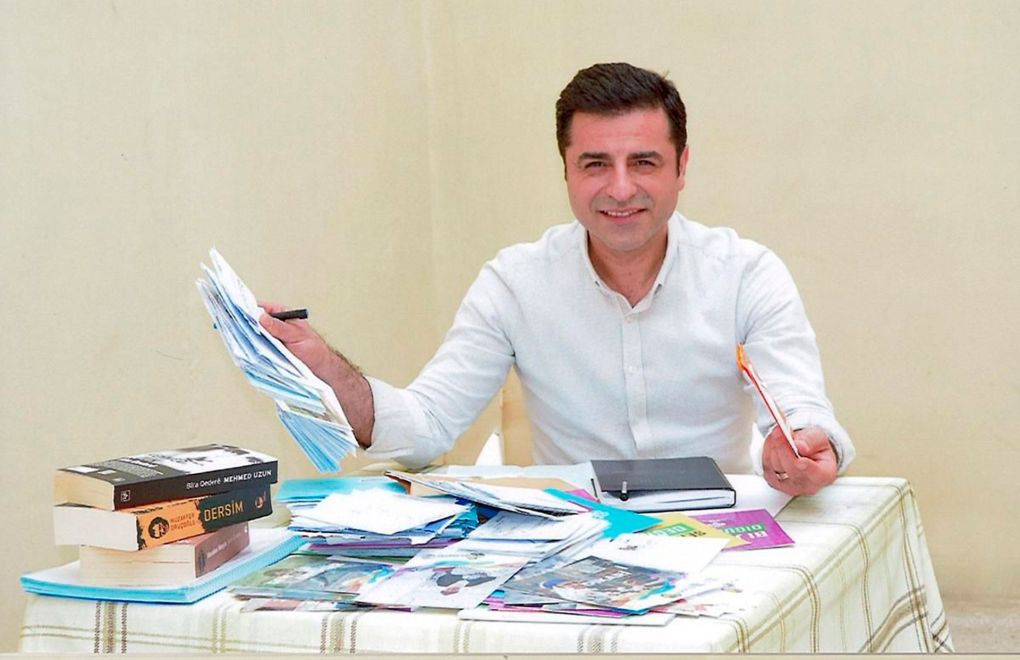Click to read the article in Turkish
Imprisoned for five years, Peoples' Democratic Party (HDP) former Co-Chair Selahattin Demirtaş has frequently shared his opinions on the country's next presidential and parliamentary elections over the past few months.
In a new article published in daily Evrensel today (November 15), Demirtaş listed several questions about how the country's left can unite and become stronger in the elections, which are due to be held in June 2023.
CLICK - Demirtaş calls for a 'strong left bloc' for post-AKP era
Saying that all the previous attempts to form a united left bloc failed by the left itself, Demirtaş called on the left "not to miss a historic opportunity this time."
"I want it to be known that I am not making an appeal to solve the problem of unity in the left, which has not been solved for years, all of a sudden from the prison," he wrote.
"Let me try to explain my point more clearly by asking simple questions to the leftists of Turkey."
He listed the following questions:
- Will socialists and leftists take part in the election with their own presidential candidate or will they support the opposition's joint candidate from the first round?
- If they will take part in the election with their own candidate, what kind of candidate, principles and program will they come up with?
- How will they organize the election campaign?
- What stance will they take in a possible second round?
- If they will gather around the opposition's joint candidate, what do they need to do to be on the table about the determination of that candidate and their program and principles?
- If they will take part in the election under an umbrella party, which party is it going to be? If they will not be an umbrella party, what can be done to form a socialist group of at least 20 people in the parliament?
- Can the socialist parliamentary group to be formed grow into an umbrella party? Can it take part in coalition governments as a socialist group?
- If the government changes after the elections, tens of thousands of new cadres, especially governors, sub-governors, rectors, deans and high-level ministerial bureaucrats, may take office. How many qualified bureaucrats who are on the side of the left and labor and with a woman identity can contribute to democratization with a leftist perspective by assuming these positions? Who can these people be?
- How can the civil and cultural space and the unions be strengthened against the danger of the degeneration of the left by being integrated into the state and the power?
About Selahattin Demirtaş
Politician, lawyer, writer, poet and artist.
He was the Executive Board Member and Branch Chair of the Human Rights Association (İHD) Diyarbakır Branch. When Demirtaş was its Chair, the Association's policy was oriented towards addressing the unidentified murders. In the same period, he was also among the founders of the Human Rights Foundation of Turkey (TİHV-HRFT) and Amnesty International Diyarbakır.
He held executive positions in the Human Rights Foundation of Turkey (TİHV-HRFT) and Amnesty International Turkey.
Entering politics at the Democratic Society Party (DTP) in 2007, Demirtaş was elected an MP in the 23rd Legislative Session. He joined the DTP group at the Grand National Assembly of Turkey (TBMM) and was the Parliamentary group deputy chair. After the DTP was closed in 2009, he and Gültan Kışanak were elected the Peace and Democracy Party (BDP) Co-Chairs.
At the General Elections in 2011, he was elected the Hakkari MP of the Labor, Democracy and Freedom Bloc in the 24th Legislative Session.
BDP Co-Chair during the Resolution Process for the Kurdish Questions, Demirtaş and Figen Yüksekdağ were elected the Co-Chairs of the Peoples' Democratic Party (HDP) on June 22, 2014.
Running for President at the Presidential Election on August 10, 2014, Demirtaş was elected an MP at both June 7 and November 1 elections in 2015.
After the legislative immunity of several lawmakers facing summaries of proceedings were lifted on May 20, 2016, over 90 files about Demirtaş were sent to the Ankara Chief Public Prosecutor's Office.
Stripped of his MP status and arrested, Selahattin Demirtaş faces two aggravated life sentences and 486 years in prison in total. His convictions in other cases have also become final.
Demirtaş was born in Turkey's Kurdish-majority southeastern province of Diyarbakır in 1973. He graduated from the Faculty of Law of Ankara University. He worked as a self-employed lawyer. (AS/VK)










